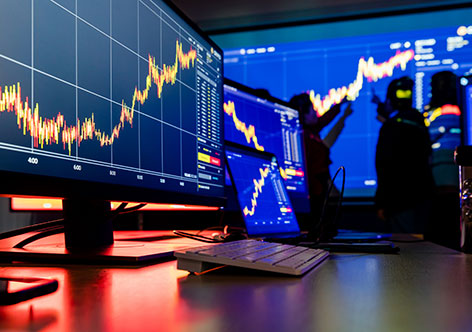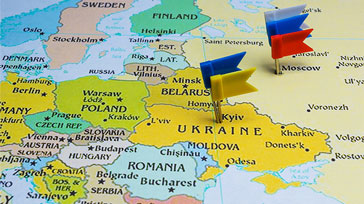Key Highlights
- Sanctions set to kick in as Russia launches military action in Ukraine
- Energy producers the most likely beneficiaries as oil and gas prices rise
- Higher prices and diminished sentiment poses a tail risk to global growth
- UOBAM’s de-risking process had already started and will continue
A shock to markets
The launch of Russian military operations in Ukraine had long been threatened but until today, markets around the world did not believe that it would actually happen. Even the deployment of troops into breakaway regions of Ukraine was met with hope that this would be enough to satisfy Russia’s ambitions.
But that was yesterday. Today, at the time of writing, a full scale invasion of Ukraine appears to be taking place, and markets are now left recalibrating all previous assumptions. And as the world holds its breath in anticipation of President Putin’s next move and President Biden’s promised retaliation, investors are trying to assess the likely end-game.
While it appears almost certain that tough sanctions will be imposed on Russia that will affect its oil supplies to parts of Europe, supply disruptions in the rest of the world is not guaranteed. For example, Asia compared to other markets has a relatively low dependence on Russian energy supplies. About 1.9 million barrels per day (B/D) of Russia’s crude oil transits into the region via northern China. Russia accounts for about 14 percent of China’s crude imports and less than 10 percent for the other Asian countries, Japan is Asia’s largest importer of Russia’s LNG (liquified natural gas), with Russian projects accounting for nine percent of its LNG supply. It is thought that even if sanctions were imposed, any disruption of oil and gas supplies to Asian countries would not be severe.
Rising energy prices
But supply aside, all economies are still subject to the global energy market. Prices were already trending up due to supply disruption concerns, and the imposition of sanctions would add even more upward pressure and further compound inflationary concerns. If the situation does not de-escalate, oil, natural gas and metal prices can be expected to stay uncomfortably high.
For example, Brent has almost reached US$100 per barrel, while aluminum and nickel are at, or close to, their record highs. Such cost-push inflationary pressures, if sustained, would be detrimental to global growth but the Eurozone’s economic growth would be particularly impacted. This could push Europe closer towards a stagflation scenario where both growth and inflation outlooks are adversely impacted.
Regional Impact
We are cognisant that today’s invasion is possibly the greatest security crisis to hit Europe since the Cold War, and markets could be readying themselves for the long haul. The current sell-down in global equities of almost 10 percent since the start of hostilities has exceeded that of previous geopolitical selloffs. For example, the S&P 500 Index typically corrected 6 – 8 percent on average, and quickly re-bounded thereafter.
Asia is also unlikely to be shielded from the events unfolding in Europe. However investors can draw some comfort from the region’s positive fundamentals as it continues its post-Covid recovery. Over the past few months, Asia’s industrial, IT, energy and financial sectors have outperformed their global counterparts and it is hoped that this will help provide some resilience in the months to come.
However, short of the energy and commodity sectors, it is unlikely that any market can escape from the weakness in investment sentiment and increased volatility that looks set to ensue from today’s Russia invasion. If hostilities continue, there is potential for a growth slowdown in Europe that in a worse case scenario, could spread to the rest of the world.
In recent weeks, UOBAM’s risk management monitors have been triggered by rising market volatility. As such, our portfolio managers had started to take actions to de-risk their portfolios. This includes raising the portfolios’ cash holdings, reducing high risk equity and high yield bond exposures, and increasing allocations to alternative assets such as commodities.
Meanwhile we continue to monitor the situation closely and are on the lookout for broader negative spillover impacts into global markets. Conversely, assuming that there is no escalation of the military conflict involving foreign troops, it is possible that the current situation can be contained within Ukraine and its immediate neighbours. In such a case, it is conceivable that global growth will be less impacted and global markets could start stabilise once the dust settles.
This publication shall not be copied or disseminated, or relied upon by any person for whatever purpose. The information herein is given on a general basis without obligation and is strictly for information only. This publication is not an offer, solicitation, recommendation or advice to buy or sell any investment product, including any collective investment schemes or shares of companies mentioned within. Although every reasonable care has been taken to ensure the accuracy and objectivity of the information contained in this publication, UOB Asset Management Ltd (“UOBAM”) and its employees shall not be held liable for any error, inaccuracy and/or omission, howsoever caused, or for any decision or action taken based on views expressed or information in this publication. The information contained in this publication, including any data, projections and underlying assumptions are based upon certain assumptions, management forecasts and analysis of information available and reflects prevailing conditions and our views as of the date of this publication, all of which are subject to change at any time without notice. Please note that the graphs, charts, formulae or other devices set out or referred to in this document cannot, in and of itself, be used to determine and will not assist any person in deciding which investment product to buy or sell, or when to buy or sell an investment product. UOBAM does not warrant the accuracy, adequacy, timeliness or completeness of the information herein for any particular purpose, and expressly disclaims liability for any error, inaccuracy or omission. Any opinion, projection and other forward-looking statement regarding future events or performance of, including but not limited to, countries, markets or companies is not necessarily indicative of, and may differ from actual events or results. Nothing in this publication constitutes accounting, legal, regulatory, tax or other advice. The information herein has no regard to the specific objectives, financial situation and particular needs of any specific person. You may wish to seek advice from a professional or an independent financial adviser about the issues discussed herein or before investing in any investment or insurance product. Should you choose not to seek such advice, you should consider carefully whether the investment or insurance product in question is suitable for you.
UOB Asset Management Ltd. Company Reg. No. 198600120Z





